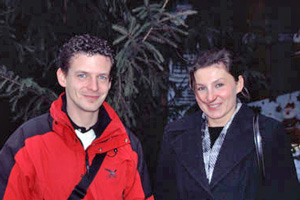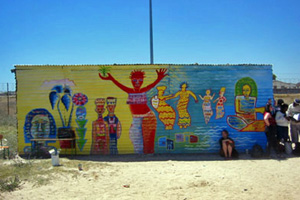|
The two German volunteers wrote in their final report: It seems that we looked very helpless and surprised, when we entered the arriving hall, because a young man – Glen - came to us and asked us, if we are Helene and Sven from After we stored our bags in our room at a backpackers lodge in Observatory – our home for he next three months – we made a short sightseeing trip threw the City of Cape Town, but we were so tired, that we didn´t realised the things around us and therefore went early to bed at our first night in Cape Town. The next unexpected experience with the South African culture we had the next morning. We went to the office of Abalimi Bezekhaya and drove with some of the Staff members to an “important” meeting. But this meeting didn´t take place, because half of the participants didn´t show up, because they have been invited for the next week or thought so … The first weekend in Accompanied by Glen on Saturday we went to the birthday party of Nosisas niece. Never before we have seen so many people inside such a little “house”, but Glen told us, for him it was the same surprise. On Sunday Nosisa boss Landy Wright, showed us the opposites in She took us to a township just a few hundret meters away from one of the richest communities in Cape Town: "Constantia", and then the favourite tourist attraction “V&A Waterfront and the wonderful beaches and bays … and then again shacks from one end of the horizon to the other in the township of Khayelitsha …” Before Sven and Helene could start with their project, they came to know another Souhtafrican culture: the culture of meetings. Each Monday there was a weekly meeting from 9:30 Uhr till 16:00 Uhr and during the week there were another two or three meetings … But the most fascinating thing fort he two german volunteers was not the number of meetings ort he long time they spend at the office while attending the meetings, but the way how they took place: „After somebody read the minutes of the last meeting loud and clear, the participants discuss, which items have to be discussed again. During the discussion somebody writes down all this items and after that the actual meeting can start. Sven reviews the meetings like this: "It was interesting to see, that the participants had good, fruitful and sometimes controversial discussions, but often nobody wants to make a decision (I don´t know why) and so often there are no consequences after a fruitful discussion. So we ask ourselves about the efficiency of those meetings. Maybe the missing efficiency is the reason why so many items have to be discussed again and again in more and more meetings … If we look at our concrete project we also had to fight against the South African meeting-culture. As an example we had to find out, that although we had meetings with the schools and hadconctrete agreements, a lot things went just in the other direction …” During the first weeks the staff members from Abalimi and SEED. showed the two german volunteers their work und showed a presentation of the Bauwagen-idea at two selected schools together with them. The schools were: K 1 - At the end of the day only the The difference between the German workshops and the South African workshops is the environmental educational background of the workshops in Some of the contents of the South African workshops were: Why is it important to save water? Why do we plant trees? Where should we put our rubbish? Only after this ecological input, the team asked the learners about their wishes for the renewal of the schoolground. A question people very often ask the German volunteers is: What is the difference between the German and the South African learners? Helene answers: "At Out of the (Ergebnisse) of the workshops Helene and Sven created a draft, which they showed the teachers and learners, who liked the plan the two German volunteers made. The realisation of the draft took place from March to June 2005, because of the weather conditions. In November/December it´s too hot and dry to plant shrubs and trees and to start a food garden. To finalize the project phase in December 2004 the learners, teacher and german volunteers selected a wooden building, where the fifth class is (unterrichtet) for an art-project. Together with the South African artist Thulani Shuku and the German artist Uta Göbel-Groß 10 learners and the Bauwagen-Team created a mural. At the 3rd December the school celebrated the (Fertigstellung) of the mural and the farewell of the two German volunteers.
"During the time in But there were also some things in Besides all the fencing, which surrounded us everywhere we stayed – we were shocked by the deeply rooted precautions of the white people against the black people: Most of the white Capetonians we met were shocked, when they heard, that we work in Khayelitsha (“Aren´t you afraid to at “their” place?”). Our landlady didn´t like it, that we brought black people into the lodge (“Do you really trust them?”) and so on. The most thing of utmost importance happend to us at a “compost-farm”, which we visited together with two white and three black staff memebers of Abalimi Bezekhaya. We wanted to examine the quality of the compost. The white owner of the compost farm shook hands only with the white people and ignored the black fieldworker of Abalimi totally. Even when the fieldworker, who were the most experienced with the aim of compost quality, asked him some questions, the owner answered the questions to us and the other white staff memebers of Abalimi. He did not deign to look at the black fieldworkers. We hadn´t expect such an habit 10 years after the end of apartheid-regime. On the other hand we also made experiences just the other way round. In a lot of meetings, happenings and other opportunities we met very open minded South Africans (black and white). So we have the hope that the differencies and contrasts in the South African Society will change – slowly but surely – and will disappear in a few generations. |
||





